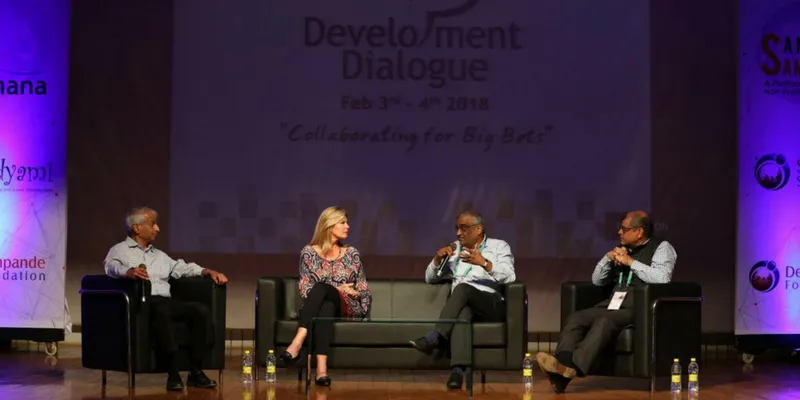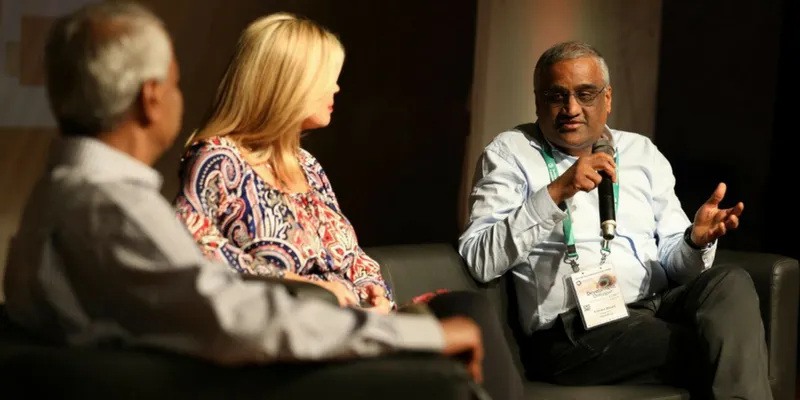‘In India, consumption means development,’ says Kishore Biyani, Founder, Future Group
At Development Dialogue, organised at Hubli, the panel discussed various topics, ranging from the need to spearhead social change to conserving the environment.
At the eleventh edition of Development Dialogue, an annual summit organised by Deshpande Foundation, the theme for discussion was ‘Collaborating for Big Bets.’ The inaugural panel was chaired by Kishore Biyani, Founder of Future Group; Carrie Morgridge, vice-president of the Morgridge Family Foundation; Amit Chandra, Founder of Bain Capital and Desh Deshpande, founder of Despande foundation. Conference attendees were invited to deliberate on what counts the most in the new India.

A platform for social entrepreneurs to showcase proven ideas, models and innovations, the summit is an international conglomeration of social enterprises, leaders from non-profit and for-profit organisations. The annual event that is held in Hubli, Karnataka, every year, brings together a diverse set of participants which includes practitioners, philanthropists, business leaders, directors, local government representatives, international delegates, entrepreneurs, academics, investors, grassroots activists, local community representatives, and global visionaries.
Emphasising that today’s India needs leaders who are willing to spearhead a social change in the country, Amit Chandra who is one of the board members in Tata Sons, said,
Audacity of goals is missing in the social sector. We need more people to stand up and ask for change.
He also mentioned how micromanagement cannot be a trait of a leader and how one is supposed to continuously attract new talent in any sector.
Amit, who in 2007 migrated from the banking sector to private equity, thinks that ‘ideas are overrated’ and it’s the perseverance and the execution of an idea, that takes one’s initiative forward.” He quipped how he has found a best friend in failure.
Adding to this, Kishore Biyani shared his views on the relevance of social enterprises, especially when profits are not yet a part of the big picture for many of them.
Collaborating for big bets is all how we connect the different sections of the community and enable to them to scale the solutions that solve problems
For someone who has always been unapologetically vocal about his views, Kishore had the audience cheering and clapping when he spoke on how Indians liked chaos. He added,
India has given us the opportunity to explore. Here, consumption means development and this change will give rise to more education and employment. We, at Future group, want to understand India like it is supposed to be.

Future Group, which placed its online bets on futurebazaar, BigBazaarDirect and FabFurnish in the past, has had a bumpy ride. In late June last year, Kishore had decided to write off e-commerce, at least for the next two years, and redirect the focus on streamlining Future Group’s brick-and-mortar businesses, which generate far higher returns. As a pioneer in exploring the market, Kishore shared,
India is a unique country and its richness is its culture, heritage, mythology and knowledge, through which we can learn more. We should understand India in its own terms.
The panel also had Carrie Morgridge, VP, Morgridge Family Foundation, which she founded with her husband John Morgridge in 2008. The Foundation, which makes investments that transform communities through education, conservation, the arts, and health and wellness, has been operational for the past fifteen years.
Carrie, who is a philanthropist herself, lives on an island with her family and does not miss the hustle and bustle of a city life. She shared how she and her family clean the nearest beach very often as they believe that it’s their responsibility to do something about the environmental degradation across the globe. She remarked,
You don’t have to write a cheque to be a philanthropist. There are so many ways to preserve the nature — even picking your own trash matters







